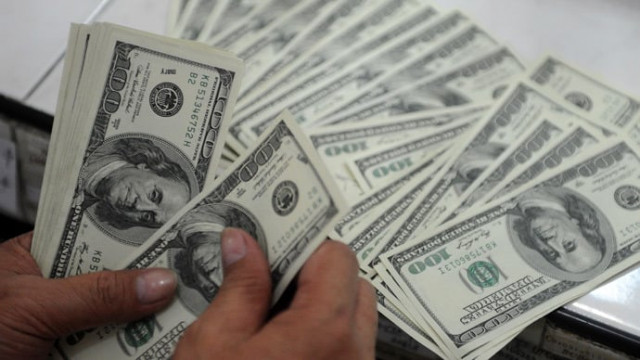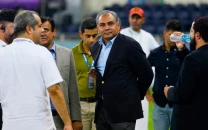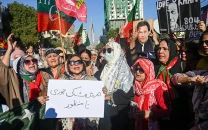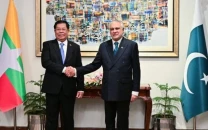Pakistan blames US for failure to curb money laundering
Pakistan’s membership of financial intelligence group pending since 2012

PHOTO: AFP
In its capacity as co-sponsor, the US was not actively supporting Pakistan’s request for membership of the Egmont Group – a club of financial intelligence units (FIU) of 156 nations, said Syed Mansoor Ali, the Director General of Pakistan’s Financial Monitoring Unit (FMU).
Ali made the statement in a meeting of the Senate Standing Committee on Finance that had called officials of the State Bank and the finance ministry to get an update on Pakistan’s request for the group’s membership.
The Egmont Group provides a platform for the secure exchange of expertise and financial intelligence to combat money laundering and terrorist financing.
Money laundering: FIA books Altaf Hussain for 'misusing KKF funds'
The official said in reply to a question that he did not know the reason behind the lacklustre US support for Pakistan’s membership. It is mandatory for an applicant state to seek the sponsorship of two members of the Egmont Group and the US and Japan had given their consent to Pakistan’s application.
Ali said both the US and Japan’s FIUs had visited Pakistan in November 2012 for observing the FMU’s facilities and systems.
The Financial Action Task Force – an inter-governmental body working to combat money laundering – recommends that its members seek the membership of Egmont Group also.
In September 2011, the federal cabinet permitted the initiation of the process of seeking the Egmont Group’s membership. It also approved allowing the US Financial Crimes Enforcement Network (FINCEN) and Japan’s Financial Intelligence Centre (JAFIC) to sponsor Pakistan’s membership.
Pakistan applied for the group’s membership in 2012 and the FINCEN and JAFIC conducted the onsite visits of the FMU. On the basis of their report, the Operation Working Group of Egmont technically cleared Pakistan’s membership, said Ali.
NAB urged to probe ‘money laundering’ allegations against Chinese company
However, the Legal Working Group of the organisation found some deficiencies in Pakistan’s Anti-Money Laundering (AML) Act and rejected the application, he added.
Ali said that unlike foreign FIUs’ single-stage agreement, the FMU was following a two-tier system for sharing information. Pakistan addressed this legal objection in December 2015 by amending the AML law and adopting the single-stage agreement with the counterparts for the exchange of information.
Pakistan had shared the latest status with both Japan and the US, requesting them to resume the process of its membership, he said. “But the US is not actively taking up our request and we do not know the reasons,” said Ali.
Implications
The FMU and the law enforcement agencies are not able to completely analyse or investigate money laundering and terrorism financing cases wherever foreign jurisdictions are involved, according to the unit’s written statement shared with the standing committee.
Zardari's aide facilitated Ayyan in 'money laundering', says ASF official
It added that mostly illicit money emanating from Pakistan due to corruption and organised and other serious crimes went out of the country.
The assets acquired in Pakistan or abroad through illicit proceeds could be traced on the receipt of intelligence from the foreign FIUs or sharing of information with them, it added.
“Absence of any mechanism to exchange financial intelligence with other FIUs leaves us devoid of the opportunity to trace back the suspicious transactions having international dimensions,” according to the FMU statement.
“The platform of the Egmont would help the FMU in analysing the suspicious transactions and tracing the proceeds of crime, uncovering criminal assets across member countries by following the trail, thereby helping the FMU and LEAs in successfully combating the menace of money laundering and terrorist financing,” it said.
“I have got an impression during my interactions with foreign dignitaries that Pakistan was resisting to be part of Egmont Group,” said Saleem Mandviwalla, the committee’s chairman. He asked the finance ministry to actively pursue the case and report back to the committee next month.
Mansoor Ali said the group’s membership was very important for Pakistan and expressed the hope that the country might be able to get it next year. He said that despite engagements with the US, there had been no productive results so far.


















COMMENTS
Comments are moderated and generally will be posted if they are on-topic and not abusive.
For more information, please see our Comments FAQ